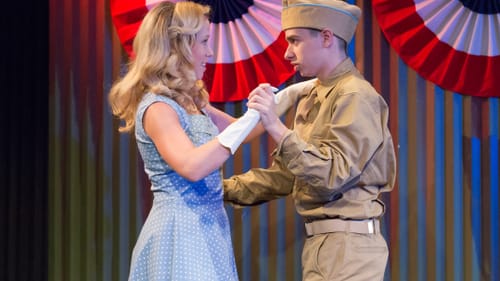Stay in the Loop
BSR publishes on a weekly schedule, with an email newsletter every Wednesday and Thursday morning. There’s no paywall, and subscribing is always free.
In the Army now
Act II Playhouse presents Neil Simon's 'Biloxi Blues'

My mother raised me not to speak ill of the dead. Unfortunately, I must review Act II Playhouse’s production of Biloxi Blues a week after its prolific author, Neil Simon, shuffled off this mortal coil at age 91.
The second work in Simon’s semi-autobiographical “Eugene Trilogy,” Biloxi Blues draws on the playwright’s experiences as an army reservist during World War II. Equal parts coming of age and fish out of water, it follows alter ego Eugene Morris Jerome (DJ Gleason) as he departs Brighton Beach, Brooklyn, for basic training in the swampy wilds of Mississippi.
The play attempts to balance Simon’s trademark jocularity with remembrance and regret; critics saw it as a major departure when it premiered in 1985. Alas, the years haven’t been particularly kind, and Tony Braithwaite’s schtick-speckled staging does the material no favors.
Fart jokes and fag jokes
Biloxi Blues signals a desire to give the audience more than just an easy laugh. Simon courts serious dramatic issues, including alcoholism, homosexuality, and the very real possibility that Eugene and his comrades will die in battle. But Simon’s strength as a writer never lay in character development, and more often than not, his script reverts to Borscht Belt comedy whenever matters threaten to get too heavy.
The humor here largely circles the drain. If Simon isn’t giving you a fart joke, he’s giving you a fag joke. By the middle of the first act, the punchlines are coming faster than artillery fire, and the playwright abandons virtually all attempts at imbuing his young soldiers with inner lives. The melodramatic personal revelations he crams in late into the play land with a thud.
Even Eugene, who steps out of the play’s frame to serve as narrator, rarely transcends his juvenile desires to fall in love and lose his virginity. (That he becomes a spectacularly successful comedy writer — another dream — is a given). When he does attempt introspection, it sputters out in treacly platitudes.
I don’t envy Braithwaite the challenge of bringing order to Simon’s chaotic universe. But his solution too often is to amp up the comedy. The pacing reaches a fever pitch early on, as if in a Feydeau farce, and stays at that level throughout.
This style sacrifices any individuality among the ancillary characters; Eugene’s bunkmates, played by Zachary J. Chiero, Ryan Hagan, Chris Monaco, and Michael Rizzo, remain largely interchangeable.

Madonnas and whores
The central figures suffer similar fates. Arnold Epstein, Simon’s conception of an intellectual ideal sent to put the army on its toes, mostly reads like a compendium of stereotypes: thick glasses, nervous stomach, and a smart-aleck retort for every order shouted in his face. Luke Bradt never elevates the character beyond his initial mousy disposition, which makes it hard to buy him as the kinetic, disruptive figure he’s meant to represent for Eugene.
Likewise, Andrew Criss’s performance as the supposedly sadistic Sergeant Merwin J. Toomey never strikes a balance between outward bravado and inward torture. He sure looks the part of a grizzled soldier in his regulation uniform (costumes by Janus Stefanowicz), but he sets an underpowered tone from his first entrance, more friendly than fearsome. Without a real sense of terror imparted in the early scenes, his sympathetic transition late in the play falls flat.
Gleason’s characterization of Eugene hasn’t changed much since he played the role in Act II’s 2017 production of Brighton Beach Memoirs. He favors an aw-shucks, aren’t-I-cute? style of acting that grows tiresome quickly. If Simon intends Biloxi Blues to show Eugene’s transition from boy to man, Gleason fails to make the case.
Women get the short shrift, as is often the case in Simon. Here he replaces the bellowing harridans of Brighton Beach Memoirs, who rival anyone found in the Philip Roth canon, complete with a literal Madonna/whore juxtaposition.
Eugene pops his cherry with a blowsy, middle-aged hooker named Rowena (Heather Plank), but he pines for virginal, catholic Daisy Hannigan (Anne Wechsler), a schoolgirl in nearby Gulfport. We learn little about either woman; they function merely as wish fulfillment. Like many straight white male playwrights, Simon had little interest in women beyond what they have to offer men.
Such retrograde sexual politics are merely one element of many that don’t play well in 2018. Biloxi Blues offers little in the way of actual insight, which makes a revival hard to justify. Sorry, Mom — it had to be said.
What, When, Where
Biloxi Blues. By Neil Simon, Tony Braithwaite directed. Through September 30, 2018, at Act II Playhouse, 56 E. Butler Avenue, Ambler, Pennsylvania. (215) 654-0200 or act2.org.
Sign up for our newsletter
All of the week's new articles, all in one place. Sign up for the free weekly BSR newsletters, and don't miss a conversation.
 Cameron Kelsall
Cameron Kelsall